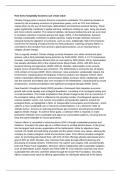How every hospitality business can create value
Climate change poses a serious threat to ecosystems worldwide. This alarming situation is
caused by the increasing emissions of greenhouse gases, such as CO2 and methane,
mainly driven by the use of fossil fuels, deforestation and intensive livestock farming. These
gases significantly contribute to global warming, leading to melting ice caps, rising sea levels
and more extreme weather. This reduces habitats, decreases biodiversity and can even lead
to complete extinction of animal species (De Jager, 2023). In the Netherlands, livestock
farming considerably contributes to global warming, mainly through methane emissions
released during the digestion of ruminants, such as cows. Additionally, high CO2 emissions
result from the clearing of tropical forests for feed production. Catering company Albron, is
committed to the transition from animal to plant-based proteins, as an essential step to
mitigate climate change.
This is urgently needed: Climate change currently threatens one million animal and plant
species, with a third potentially facing extinction by 2100 (WWF, 2023). A 1.5 ºC temperature
increase, could significantly diminish 90% of coral reefs by 2050 (KNMI, 2023). Deforestation
has already eliminated 46% of the original forests (Boommade, 2023), with 80% due to
livestock farming and agriculture (WWF, 2023-b). Besides, deforestation is the second-
largest source of greenhouse gas emissions. The Netherlands is among the top 10 largest
CO2 emitters in Europe (WWF, 2024). Moreover, meat production substantially impacts the
environment, requiring about 25 kilograms of feed to produce one kilogram of beef, which
further exacerbates deforestation and emissions (Milieu Centraal, 2023). Additionally, 2023
was the warmest and wettest year ever recorded in the Netherlands, characterized by record
temperatures, extreme precipitation and significant ecological damage (KNMI, 2024).
Kate Raworth’s Doughnut Model (2020) provides a framework that integrates economic
growth with social equality and ecological boundaries, consisting of an ecological ceiling and
a social foundation. This model emphasizes that climate change arises from an overshoot of
the ecological ceiling, which is reflected in the growing number of endangered species and
extreme weather events. Our current consumption and production patterns exceed the
ecological limits, as highlighted in SDG 12 ‘Responsible Consumption and Production’, which
calls for a more sustainable use of resources (United Nations, n.d.). Moreover, SDG 13
‘Climate Action’, focuses on reducing greenhouse gas emissions and enhancing resilience
against climate change. To achieve these goals, a collective effort is required, to make
production methods more sustainable and adjust our consumption patterns, ensuring that we
keep the planet habitable for future generations.
Caterer Albron is committed to achieving these SDG’s through sustainable practices and
initiatives. Founded 125 years ago as a coffee house to combat alcohol abuse, it has grown
into the largest food service organization of the Netherlands. While its objectives have
evolved, the health and well-being of people and the planet remain core values, allowing the
company to create ecological, social and economic value. First, Albron provides ecological
value by promoting plant-based food, with 44% of their offerings already plant-based and a
goal of 60% by 2030. Besides, they minimize food waste through efficient planning and
processing of residual streams. Furthermore, the caterer uses organic milk, animal-friendly
beef and Planet Proof vegetables. Moreover, Albron collaborates with sustainable suppliers,
such as Weerribben Zuivel, Kipster and Tekili Koffie for CO2 reduction and they only serve
sustainable fish with ASC and MSC labels through the Good Fish Foundation. Secondly,
Albron creates social value by offering opportunities to individuals distanced to the labour





